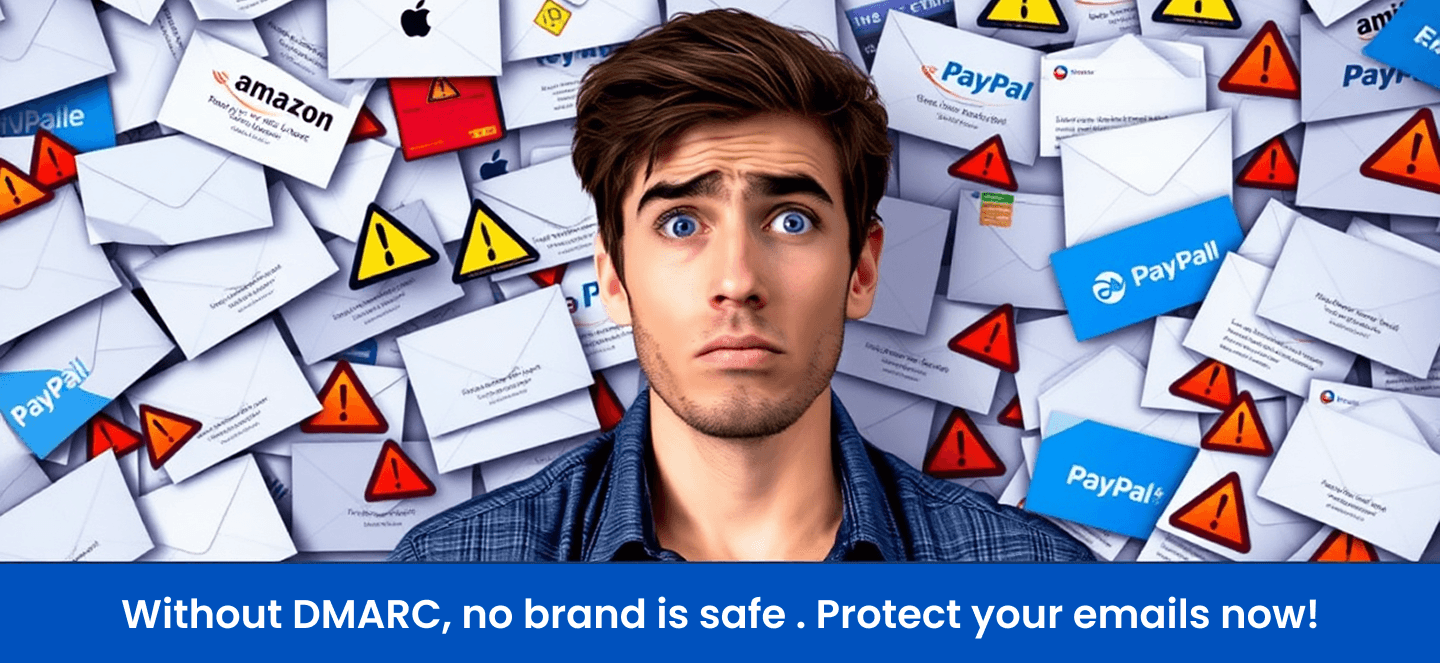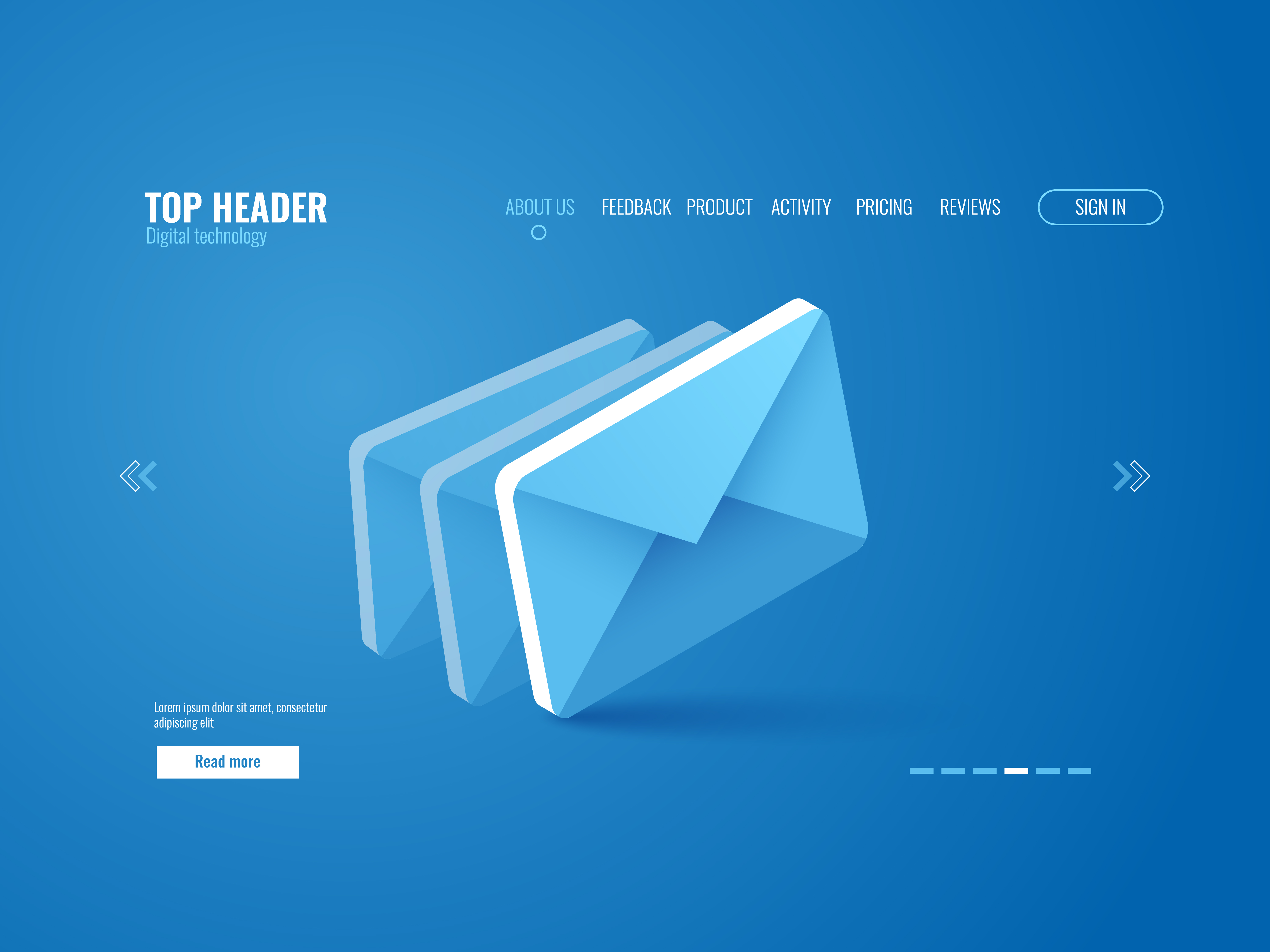What If Famous Brands Didn’t Use DMARC? A Look at Potential Email Disasters
Without DMARC, famous brands could fall victim to email spoofing, exposing their customers to phishing attacks, data breaches, and financial loss. Discover how DMARC protects against these threats and secures your brand’s email domain.

Imagine waking up one morning to find that your favorite brand—whether it’s Apple, Netflix, Amazon, or any other household name—was hacked. But it’s not their actual systems that are breached; it’s their emails. You receive an official-looking email from Amazon saying your order has been delayed, but wait… you never even placed an order! You click on the link to check, and boom—your personal data is compromised.
This is exactly the kind of chaos that could unfold if major brands failed to implement **DMARC protection**. Email spoofing and phishing attacks have become some of the most dangerous cybersecurity threats, and without **DMARC email authentication**, these attacks could easily slip under the radar.
**What Is DMARC, and Why Do Big Brands Need It?**
**DMARC (Domain-based Message Authentication, Reporting & Conformance)** is a powerful email authentication protocol that acts as a security guard for email domains. It ensures that only legitimate emails are sent on behalf of a brand, preventing malicious actors from impersonating companies, sending fraudulent emails, and tricking users into revealing personal data. [**DMARC for email security**](https://www.yourdmarc.com/blogs/email-security/advice-for-teaching-staff-members-about-dmarc-records-best-practices-and-email-security) is critical because it gives businesses control over who can send emails from their domain, preventing malicious email senders from exploiting brand reputations.
Let’s now imagine a world where some of the most famous brands don’t have DMARC in place. Here are the consequences:
**1. Apple: "Your iCloud Storage is Full—Click Here to Upgrade!"**
Without DMARC in place, cybercriminals could easily spoof Apple’s domain and send fake **iCloud upgrade emails** to thousands of unsuspecting users. Imagine users thinking they are securing their data by clicking on a phishing link—only to have their Apple IDs and sensitive data stolen. **Phishing email attacks** targeting high-profile brands like Apple can have disastrous effects, including significant **brand damage** and financial loss.
**2. Netflix: "Update Your Payment Details or Lose Access!"**
Cybercriminals love stealing credit card details, and without [**DMARC protection**](https://www.yourdmarc.com/tools/dmarc-lookup), they could easily impersonate **Netflix** to send fake urgent messages requesting users to update their payment information. When users unwittingly provide their financial details, this can result in widespread **credit card fraud** and customer financial loss. **Email spoofing** of companies like Netflix can quickly escalate, causing significant damage to a brand’s trustworthiness and user base.
**3. Amazon: "Your Order Has Been Shipped! Click to Track"**
A fake Amazon email saying your package is on its way might seem harmless. But when you click the tracking link, it could lead to malware installation on your device. Without **DMARC email authentication**, it’s nearly impossible to stop this type of attack in its tracks. Email fraud targeting e-commerce giants like Amazon could cause a huge PR nightmare and financial loss due to compromised data and customer trust.
**4. Tesla: "Exclusive Pre-Orders for Our New Model—Secure Yours Now!"**
Tesla fans would be thrilled at the idea of an exclusive pre-order offer for the next big vehicle release. However, cybercriminals can easily exploit this enthusiasm by sending **Tesla phishing emails**. Without DMARC in place, **phishing attacks** could convince unsuspecting customers to pay deposits for a non-existent car. This would not only result in financial loss for customers but also a major blow to Tesla’s **brand reputation**.
**The Domino Effect of No DMARC**
When brands fail to secure their email domains, the damage isn’t limited to just customers—it also severely impacts the brand’s reputation, trust, and bottom line. Trust in a brand is crucial, and when customers repeatedly fall for email scams, they lose confidence. A single **email spoofing attack** can snowball into a **PR disaster** that takes years to recover from, both financially and reputationally.
**The Good News: DMARC Is the Solution**
Thankfully, major brands like Apple, Netflix, Amazon, and Tesla take email security seriously and have implemented DMARC protection to prevent these disasters. But if your company hasn’t yet implemented it, now is the time!
DMARC email authentication offers a robust defense against phishing attacks and email spoofing. Here’s how DMARC can help your brand:
✅ **Protect customers from phishing attacks** by ensuring that only legitimate emails are sent from your domain.
✅ **Prevent financial and reputational damage** by stopping fraudulent emails before they can do any harm.
✅ **Gain visibility** into who is sending emails on your behalf, ensuring that only authorized entities have access.
**Final Thoughts**
If famous brands ignored **DMARC protection**, we would live in a world of endless scams, fraud, and **cybersecurity nightmares**. Luckily, these brands take email security seriously and have taken steps to secure their [**email domains**](https://www.yourdmarc.com/domain-scanner) with **DMARC**, protecting both their customers and their reputations.
Don’t wait until your brand becomes the next phishing target. Secure your emails with [DMARC](https://www.yourdmarc.com/signup) today!
This is exactly the kind of chaos that could unfold if major brands failed to implement **DMARC protection**. Email spoofing and phishing attacks have become some of the most dangerous cybersecurity threats, and without **DMARC email authentication**, these attacks could easily slip under the radar.
**What Is DMARC, and Why Do Big Brands Need It?**
**DMARC (Domain-based Message Authentication, Reporting & Conformance)** is a powerful email authentication protocol that acts as a security guard for email domains. It ensures that only legitimate emails are sent on behalf of a brand, preventing malicious actors from impersonating companies, sending fraudulent emails, and tricking users into revealing personal data. [**DMARC for email security**](https://www.yourdmarc.com/blogs/email-security/advice-for-teaching-staff-members-about-dmarc-records-best-practices-and-email-security) is critical because it gives businesses control over who can send emails from their domain, preventing malicious email senders from exploiting brand reputations.
Let’s now imagine a world where some of the most famous brands don’t have DMARC in place. Here are the consequences:
**1. Apple: "Your iCloud Storage is Full—Click Here to Upgrade!"**
Without DMARC in place, cybercriminals could easily spoof Apple’s domain and send fake **iCloud upgrade emails** to thousands of unsuspecting users. Imagine users thinking they are securing their data by clicking on a phishing link—only to have their Apple IDs and sensitive data stolen. **Phishing email attacks** targeting high-profile brands like Apple can have disastrous effects, including significant **brand damage** and financial loss.
**2. Netflix: "Update Your Payment Details or Lose Access!"**
Cybercriminals love stealing credit card details, and without [**DMARC protection**](https://www.yourdmarc.com/tools/dmarc-lookup), they could easily impersonate **Netflix** to send fake urgent messages requesting users to update their payment information. When users unwittingly provide their financial details, this can result in widespread **credit card fraud** and customer financial loss. **Email spoofing** of companies like Netflix can quickly escalate, causing significant damage to a brand’s trustworthiness and user base.
**3. Amazon: "Your Order Has Been Shipped! Click to Track"**
A fake Amazon email saying your package is on its way might seem harmless. But when you click the tracking link, it could lead to malware installation on your device. Without **DMARC email authentication**, it’s nearly impossible to stop this type of attack in its tracks. Email fraud targeting e-commerce giants like Amazon could cause a huge PR nightmare and financial loss due to compromised data and customer trust.
**4. Tesla: "Exclusive Pre-Orders for Our New Model—Secure Yours Now!"**
Tesla fans would be thrilled at the idea of an exclusive pre-order offer for the next big vehicle release. However, cybercriminals can easily exploit this enthusiasm by sending **Tesla phishing emails**. Without DMARC in place, **phishing attacks** could convince unsuspecting customers to pay deposits for a non-existent car. This would not only result in financial loss for customers but also a major blow to Tesla’s **brand reputation**.
**The Domino Effect of No DMARC**
When brands fail to secure their email domains, the damage isn’t limited to just customers—it also severely impacts the brand’s reputation, trust, and bottom line. Trust in a brand is crucial, and when customers repeatedly fall for email scams, they lose confidence. A single **email spoofing attack** can snowball into a **PR disaster** that takes years to recover from, both financially and reputationally.
**The Good News: DMARC Is the Solution**
Thankfully, major brands like Apple, Netflix, Amazon, and Tesla take email security seriously and have implemented DMARC protection to prevent these disasters. But if your company hasn’t yet implemented it, now is the time!
DMARC email authentication offers a robust defense against phishing attacks and email spoofing. Here’s how DMARC can help your brand:
✅ **Protect customers from phishing attacks** by ensuring that only legitimate emails are sent from your domain.
✅ **Prevent financial and reputational damage** by stopping fraudulent emails before they can do any harm.
✅ **Gain visibility** into who is sending emails on your behalf, ensuring that only authorized entities have access.
**Final Thoughts**
If famous brands ignored **DMARC protection**, we would live in a world of endless scams, fraud, and **cybersecurity nightmares**. Luckily, these brands take email security seriously and have taken steps to secure their [**email domains**](https://www.yourdmarc.com/domain-scanner) with **DMARC**, protecting both their customers and their reputations.
Don’t wait until your brand becomes the next phishing target. Secure your emails with [DMARC](https://www.yourdmarc.com/signup) today!
